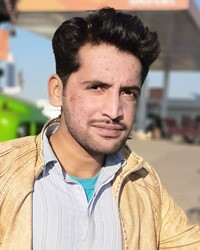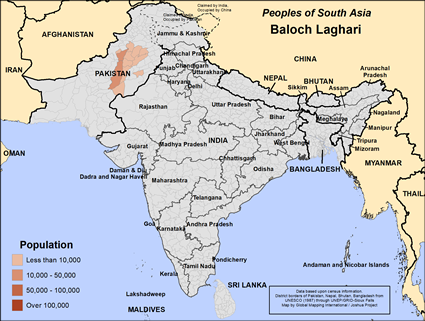The Baloch people live in the southernmost region of the Iranian plateau in Pakistan, Iran, and Afghanistan. They speak the Balochi language. It is believed that the name "Baloch" is derived from the name of the Babylonian king and god Belus. Some believe the word is a derivation of Sanskrit words "Bal" meaning strength and "Och" meaning high or magnificent.
The Baloch claim their origins to be in Aleppo in what is now Syria. They are descendants of Hazrat Ameer Hamza, the uncle of Islamic prophet Muhammad. Based on an analysis of the linguistic connections of the Balochi language, the original homeland of the Balochi tribes was likely the east or southeast area of the central Caspian region. The Baloch generally live in remote mountainous and desert regions, which provides protection from invasions. They live mainly in the Balochistan region of the southeastern-most edge of the Iranian plateau in Pakistan, Iran and Afghanistan, as well as in the Arabian Peninsula.
The Baloch peoples are subdivided among over 130 tribes. One of these is the Laghari Baloch, who speak the Eastern Balochi language.
The Laghari live according to Baloch customs. Their men wear long shirts with long sleeves and loose pants. They sometimes wear turbans on their heads. The Baloch living in Iran observe a more conservative dress code; some women cover their faces with thick red wools and wear a head scarf and long veil. Gold ornaments such as necklaces and bracelets are an important aspect of Baloch women's traditions. They usually wear a gold brooch that is used to fasten two parts of the dress together over the chest. They pass traditions to children through oral history retelling. The tradition of a Baloch mother singing lullabies to her children has played an important role in the transfer of knowledge from generation to generation for many centuries.
The Laghari Baloch follow Sunni Islam, practicing regular prayers, fasting during Ramadan, and observing Islamic festivals. Mosques serve as important centers for worship and social gatherings. While Islamic teachings guide their spiritual and moral lives, they also observe some traditional Baloch customs, creating a unique blend of religious and cultural identity.
The Laghari Baloch face numerous challenges due to their remote and harsh living conditions. Limited access to basic services such as healthcare and education results in low literacy rates and inadequate medical care. Economic opportunities remain scarce, with many families struggling to sustain themselves through pastoralism and small-scale farming. Underdeveloped infrastructure in Balochistan complicates transportation and communication.
Pray that the Laghari Baloch may be open to Jesus Christ and his gospel.
Pray that God will provide workers who speak the Balochi language to work with the Baloch peoples.
Pray for the Holy Spirit to send dreams and visions to Laghari family leaders, opening them and their families to the King of kings.
Scripture Prayers for the Baloch Laghari in Pakistan.
https://en.wikipedia.org/wiki/Baloch_people
https://www.britannica.com/topic/Baloch
https://www.atlasofhumanity.com/baloch
https://www.quora.com/What-is-your-opinion-about-Baloch-people
| Profile Source: Joshua Project |











